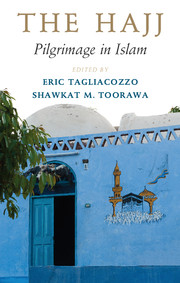Introduction
Published online by Cambridge University Press: 05 November 2015
Summary
The Hajj (Ar. ḥajj) is one of the largest gatherings of human beings on the planet; it is also one of the oldest. Every year millions of Muslims from around the world head to the city of Mecca and its environs to perform the Hajj during the month allocated for this ritual, or to perform the ʿUmra, the so-called minor pilgrimage, which can be done at any time of year. They come from all over the Middle East, but from much further afield as well – Africa, Asia, and increasingly from Europe, the Americas, and Australia. It is no exaggeration to say that the Hajj is the most important annual event in the world involving the transnational movement of human beings. The present book attempts to describe the various aspects and facets of the Muslim pilgrimage, with contributions ranging from discussions of the localized rituals of the Hajj itself to the building of a modern global infrastructure. Politics, economics, religion, global health, and transport are all part of the fabric of this volume, as is the lived experience of the pilgrimage as expressed in the literature and art of its practitioners.
We have asked specialists to weigh in with their own perspectives on how the Hajj works, so that the book can be greater than the sum of its parts. It is no doubt beyond any one person's expertise to write comprehensively about the global pilgrimage to Mecca, taking into account its many aspects and given the complexity of global connectivities – no one scholar has the languages, archival reach, or ethnographic experience to craft such a narrative. There is a long history to the pilgrimage to Mecca, but it can also be viewed through anthropological, sociological, and other disciplinary lenses. We have endeavored here to bring many of these approaches into one volume, so as to give a multivalent and multifaceted account of this enormous, international enterprise. We hope that as a collective we have succeeded in saying something cohesive and important about the Hajj as a religious, cultural, and sociopolitical phenomenon.
- Type
- Chapter
- Information
- The HajjPilgrimage in Islam, pp. 1 - 10Publisher: Cambridge University PressPrint publication year: 2015

